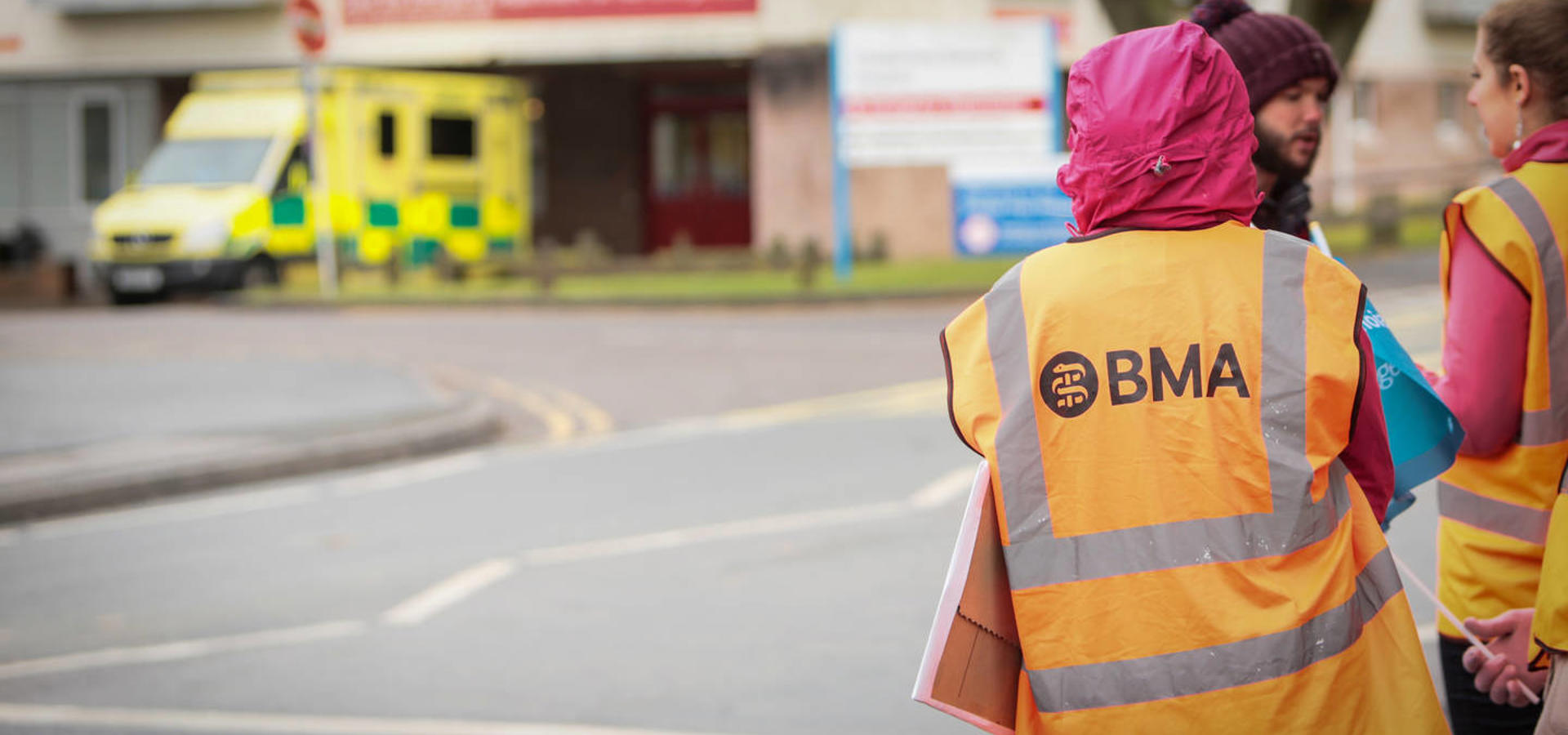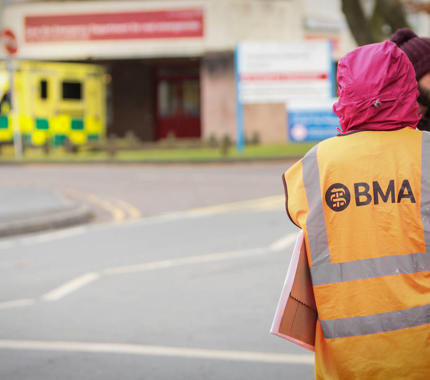Why resident doctors are striking
A crippling cost-of-living crisis, burnout and well below inflation pay rises are driving hard working doctors out of their profession, at a time when we need them more than ever.
In 2022, resident doctors were offered an insulting and well below inflation pay rise of 2%.
No-one can be expected to stay in a high pressured job where your earnings are being eroded year on year.
That's why we are calling on the Government for full pay restoration.
Watch the explainer video below on 'Why does doctors pay restoration seem to cost so much?'
Resident doctors are struggling
A recent survey carried out by the BMA has brought home the realities of life for thousands of resident doctors across the country.
Shockingly, like so many struggling families, in the last 12 months:
- more than 50% have had difficulties paying their utility bills
- nearly 50% have had to borrow money from family
- around 80% have had to reduce the amount they spend on food shopping and cut down the amount of heating they use
It's simply not right that resident doctors are in a constant battle to make ends meet. They worked flat out during the pandemic and continue to work tirelessly for their patients in the face of huge backlogs and intense pressures.
It is deeply worrying - yet unsurprising - that many doctors are rethinking their choice of career or working in the NHS.
In fact, in the past 12 months:
- 79% say they often think about leaving the NHS
- more than 85% know other resident doctors who have left to work in a different profession or work as a doctor in a different country.
The top reasons given are:
- level of current pay
- the below inflation pay award given in 2022 and pay erosion since 2008/9
- combined with deteriorating working conditions.
These are all things we are fighting to change - for the benefit of all resident doctors and for the benefit of all patients.
The Government isn't listening
To protect the NHS and prevent resident doctors moving to countries like Australia and New Zealand or changing careers altogether, the Government must address doctors' concerns.
After months of strike action and five weeks of talks between resident doctors in England and the Government, the deadline has passed, and negotiators for the Department of Health and Social Care have not been able to put forward a credible offer to end the pay dispute.
As a result, the BMA’s resident doctors committee has unanimously voted for further strike dates in December and January.
If resident doctors are forced out of the NHS because of poor pay and conditions, the government's inaction will be to blame and the services we all rely on will suffer.
Pay review process
Resident doctors' contracts are still subject to a multiple-year pay deal, and this is what led to them being awarded a paltry 2% increase for 2022/2.
However, in the Framework Agreement for 2018 contract negotiations, it's stated that the Review Body on Doctors' and Dentists' Remuneration (DDRB) is able to make further pay recommendations on behalf of resident doctors in England when requested.
The Review Body on Doctors' and Dentists' Remuneration (DDRB) themselves have commented that a decision not to apply an award to groups subject to a pay deal will have "a significant effect on motivation, affecting retention, productivity, and ultimately, patient care". They also state that the increase of 2%, set as part of the current deal "is likely not sufficient" to address those issues.
(...not applying an award to groups subject to a pay deal will have...) a significant effect on motivation, affecting retention, productivity, and ultimately, patient care.The Doctors' and Dentists' Review Body
How resident doctor pay is decided
The Doctors' and Dentists' Review Body (DDRB) is the body that sets the pay of doctors and dentists in the NHS.
It is supposed to be an independent body that keeps doctors' pay in line with "the cost of living, the movement of earnings in other professions and the quality and quantity of recruitment in all professions."
Despite this, various Governments since 1998 have successfully applied pressure to amend the Terms of Reference of the Review Body.
Over time, we have lost confidence in the DDRB's independence and approach due to Governments repeatedly disregarding its recommendations and interfering in its work.
We have frequently called for immediate and fundamental reform of the pay review process for doctors. It is painfully clear that the DDRB is not delivering on keeping doctors' pay in line with the cost of living, or other professions.
The 'resident doctor' title explained
Who are resident doctors?
resident doctors are qualified doctors in clinical training.
Where do patients see a resident doctor?
In a hospital or GP practice.
What is their level of training?
They have completed a medical degree and foundation training.
They have anywhere up to eight year's experience working as a hospital doctor, depending on their specialty, or up to three years in general practice.
All resident doctors work under the supervisor of a senior doctor.
Common titles for resident doctors
- FY1 – foundation year one resident doctor
- FY2 – foundation year two resident doctor
- ST – specialty trainee in a hospital specialty
- SpR – specialty registrar in a hospital specialty
- GPST – specialty registrar in general practice
Show your support
If you agree resident doctors are being given a raw deal, you're not alone.
A recent survey carried out by Savanta showed that a majority of the public support resident doctors taking industrial action for pay restoration, than not.
It is clear to the public that patient safety is already being compromised by poor pay and conditions. Strikes are not the biggest risk to patient safety, doing nothing and allowing the situation to get worse, is.
Together, we can make the Government sit up and take notice.
Keep up to date with our campaign and find out what you can do to show your support.
- Share on social - follow us on X (formally known as Twitter) and Instagram and share with your followers
- Tell your MP - help to make sure MPs understand resident doctors' concerns
- Donate to support striking resident doctors - help support our NHS doctors to win this fight


